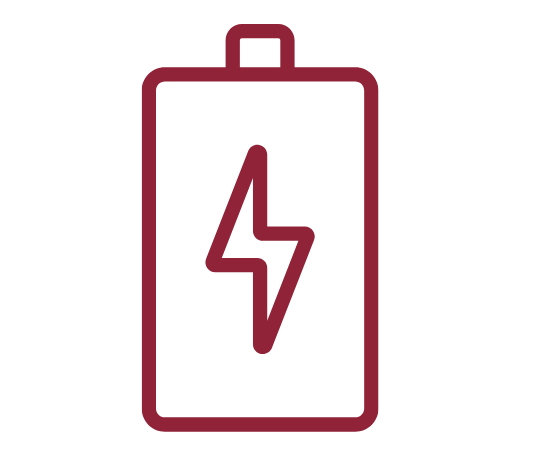Development of Safe and High-Energy Solid-State Lithium Metal Batteries Towards 500 WH/KG
Project overview
This project aims to overcome the limitations of current electric vehicle (EV) technology, focusing on enhancing the energy density, safety and cost-effectiveness of lithium-ion batteries through the development of a new polymeric solid-state electrolyte-based lithium-ion battery (SSLIB).
Addressing key issues such as range anxiety, high material costs and safety risks, the project proposes innovative solutions, including highly ionic conductive polymer solid-state electrolytes, safe and long-lasting Li metal-based anodes, and low-cost, high-energy Li-ion cathodes. Using advanced characterization methods such as synchrotron radiation, the project seeks to advance the understanding of solid-state battery mechanisms, supporting the design of future battery materials.
With a strong emphasis on developing prototype cells for solid-state batteries, this initiative leverages the expertise of leading researchers and fosters collaborations with industrial and academic partners to stimulate local economies and reduce environmental impact, while also contributing to the training of high-quality personnel.
Key project details
| Principal investigator | Xia Li, assistant professor, Chemical and Materials Engineering, Concordia University |
|
Co-principal investigators |
Karim Zaghib, professor, Chemical and Materials Engineering and CEO of Volt-Age, Concordia University; Sixu Deng, assistant professor, Chemical and Materials Engineering, Concordia University | |
Research collaborators |
Michel Armand, director of Research, Centre National de la Recherche Scientifique; Sarah Sajedi, AI Mogul; Francisco Carranza, Basquevolt; Tobias Glossmann, general manager, Mercedes-Benz; Nancy Déziel, general director, CNETE Shawinigan; Victoire de Margerie, Rondol Industries | |
| Non-academic partners | AI Mogul, Mercedes-Benz, Basquevolt, CNETE Shawinigan, Rondol Industries | |
| Research Keywords | Solid-state batteries, polymer solid-state electrolytes, Li metal anodes, high- energy cathodes, pouch cell pack, dendrites, local resources, reduced carbon emissions, critical mineral Independence, electric vehicles | |
| Budget | Cash: $200,000 In-kind: $700,000 |
Publications:
A. Nekahi, A. K. Madikere Raghunatha Reddy, X. Li, S. Deng, and K. Zaghib, “Rechargeable Batteries for the Electrification of Society: Past, Present, and Future,” Electrochem. Energy Rev., vol. 8, no. 1, p. 1, Dec. 2025, doi: 10.1007/s41918-024-00235-8.
A. Nekahi, A. K. Madikere Raghunatha Reddy, X. Li, S. Deng, and K. Zaghib, “Rechargeable Batteries for the Electrification of Society: Past, Present, and Future,” Electrochem. Energy Rev., vol. 8, no. 1, p. 1, Dec. 2025, doi: 10.1007/s41918-024-00235-8.
Q. Yu et al., “An active bifunctional natural dye for stable all-solid-state organic batteries,” Nat Commun, vol. 16, no. 1, p. 8364, Sep. 2025, doi: 10.1038/s41467-025-62301-z.
Y. Hu et al., “Solid solvation structure design improves all-solid-state organic batteries,” Nat. Chem., vol. 17, no. 9, pp. 1313–1322, Sep. 2025, doi: 10.1038/s41557-025-01866-0.
N. Vargas Perdomo, M. P. Kim, X. Li, and L. A. Cuccia, “Contemporary evaluation of triboelectric nanogenerators as self-powered devices: A bibliometric analysis from 2012 to 2023,” DeCarbon, vol. 7, p. 100093, Mar. 2025, doi: 10.1016/j.decarb.2024.100093.
M. Rezaei et al., “A review of lithium-ion battery recycling for enabling a circular economy,” Journal of Power Sources, vol. 630, p. 236157, Feb. 2025, doi: 10.1016/j.jpowsour.2024.236157.
M. Rezaei et al., “A review of lithium-ion battery recycling for enabling a circular economy,” Journal of Power Sources, vol. 630, p. 236157, Feb. 2025, doi: 10.1016/j.jpowsour.2024.236157.
G. Vegh et al., “Correction: Vegh et al. North America’s Potential for an Environmentally Sustainable Nickel, Manganese, and Cobalt Battery Value Chain. Batteries 2024, 10, 377,” Batteries, vol. 10, no. 12, p. 450, Dec. 2024, doi: 10.3390/batteries10120450.
Z. Yang et al., “Nanoscale Encapsulation of Sulfur Cathodes via Self-Healing and Polar Synergistic Multifunctional Coating for High-Performance Li–S Batteries,” ACS Appl. Nano Mater., vol. 7, no. 23, pp. 26445–26456, Dec. 2024, doi: 10.1021/acsanm.4c02936.
G. Vegh et al., “North America’s Potential for an Environmentally Sustainable Nickel, Manganese, and Cobalt Battery Value Chain,” Batteries, vol. 10, no. 11, p. 377, Oct. 2024, doi: 10.3390/batteries10110377.
E. Feyzi, A. K. M R, X. Li, S. Deng, J. Nanda, and K. Zaghib, “A comprehensive review of silicon anodes for high-energy lithium-ion batteries: Challenges, latest developments, and perspectives,” Next Energy, vol. 5, p. 100176, Oct. 2024, doi: 10.1016/j.nxener.2024.100176.
Md. M. Hassan, X.-Y. Wang, A. A. Bristi, R. Yang, X. Li, and Q. Lu, “Composite scaffold of electrospun nano-porous cellulose acetate membrane casted with chitosan for flexible solid-state sodium-ion batteries,” Nano Energy, vol. 128, p. 109971, Sep. 2024, doi: 10.1016/j.nanoen.2024.109971.
A. Nekahi et al., “Comparative Issues of Metal-Ion Batteries toward Sustainable Energy Storage: Lithium vs. Sodium,” Batteries, vol. 10, no. 8, p. 279, Aug. 2024, doi: 10.3390/batteries10080279.
A. Nizami, Z. Yang, S. Deng, R. Li, X. Li, and X. Sun, “Catalytic conversion of polysulfides by atomic layer deposition derived titanium nitride for high‐performance lithium‐sulfur batteries,” Electrochemical Science Adv, vol. 4, no. 2, p. e2200013, Apr. 2024, doi: 10.1002/elsa.202200013.
Accepted publications in national and international conferences:
A. Nizami, “Theoretical Insights into Polymer Interface Coatings for Lithium-Sulfur Battery Cathodes,” presented at the 247th ECS Meeting, May 2025.
Z. Yang, “Unravelling the Impact of Carbon Hosts on Chemistry and Microstructure Evolution in Sulfur Cathodes and Interface Design for High-Performance Solid-Sate Li-S Batteries,” presented at the 247th ECS Meeting, May 2025.
Z. Yang, “Theoretical Insights into Polymer Interface Coatings for Lithium-Sulfur Battery Cathodes,” presented at the 2025 QCAM Meeting, May 2025.
Yuxiao Zhang: Leonard F. Ruggins Engineering PhD Scholarship, Concordia University, September 1, 2025.
Nabilah Al-Ansi: Concordia Horizon PDF Fellowship, Concordia University, September 1, 2025.
Xia Li: Global Chemical Engineering Award for Outstanding Female Scientist, Global Chinese Chemical Engineers Symposium, August 30, 2025.
Natalia Vargas Perdomo: Concordia PhD Splide Fellowshipe, Concordia University, May 30, 2025.
Xia Li: Concordia Provost’s Circle of Distinction, Concordia University, April 30, 2024.
Natalia Vargas Perdomo: Concordia PhD Splide Fellowshipe, Concordia University, March 30, 2025.
Xia Li: Global Chemical Engineering Award for Outstanding Female Scientist, Global Chinese Chemical Engineers Symposium, March 30, 2025.
Xia Li: College Member of Royal Society of Canada, Royal Society of Canada, September 30, 2024.
Xia Li: Concordia Reearch Impact Award, Concordia University, September 30, 2024.
Ameer Nizami: ECS Canada Meeting Student Award, ECS, August 30, 2024.
Ameer Nizami: Concordia Public Scholar, Concordia University, June 30, 2024.
Anna Thinphang-Nga: Canadian Chemistry Conference and Exhibition Student Award, Canadian Chemistry Conference, June 30, 2024.
Research focus

Develop high-energy, affordable batteries
The overall goal is to develop solid-state batteries that achieve a high energy density (500 Wh/kg) at a moderate temperature (23 °C) while ensuring affordability with a target cost (< $100/kWh) at the pack level.

Explore polymer-based solid-state electrolytes (SSEs)
This objective is to develop polymer-based SSEs that feature high ionic conductivity (> 10 mS cm^-1) for room temperature operation (23 °C), high electrochemical stability for Li metal anode usage (> 500 plating-stripping Li-Li cycles), and high electrochemical stability for high-energy Li-ion cathodes (> 4.0 V charge-discharge).

Develop reliable anode materials
Develop reliable anode materials that include stable Li-X alloy for long battery operation (> 500 cycles), thin film Li-X-Y ternary anode (< 2 μm) for a Li dendrite-free anode, and anode free current collectors with reliable battery life (> 150 cycles).

Examine li-ion cathode materials
This objective focuses on developing high voltage polyanion cathodes (> 4.0 V) with low cost and excellent fast-charging capability, creating low-cobalt and cobalt-free NMC cathodes with high energy density (300 Wh/kg, 1000 cycles), and examining high energy and low-cost sulphur-based cathodes for long-time operation (400 Wh/kg, > 500 cycles).

Develop battery protocol design
Develop a practical battery protocol for polymer-based SSLBs that transitions from small, lab-scale single cells to practical pouch cells and finally to large-scale prismatic cells, enabling room-temperature and free-pressure operation.

Conduct advanced material characterization
This objective seeks to understand the morphology, microstructure, crystal structure, local disorder, and chemical/electrochemical information of the developed battery materials through both ex-situ and in-situ techniques, such as microscopies (SEM, TEM, STEM) and spectroscopies (XAS, XPS, Raman, FITR).
Non-academic partners
Thank you to our non-academic partners for your support and trust.




Volt-Age is funded by a $123-million grant from the Canada First Research Excellence Fund.


